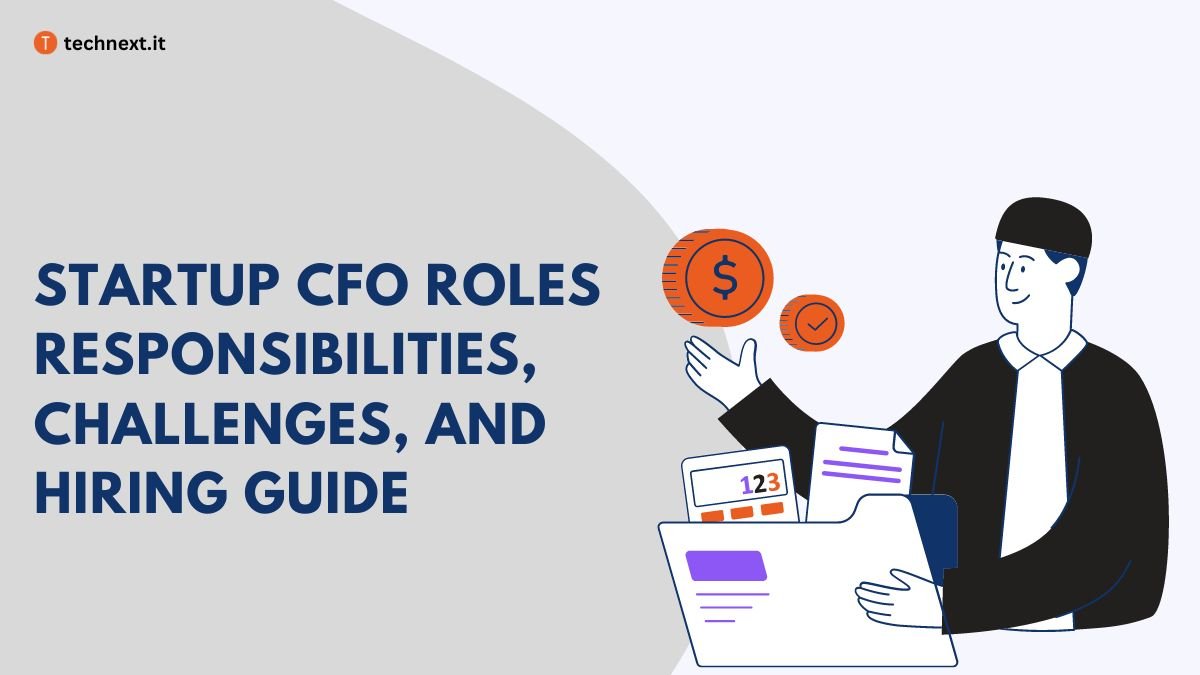Startup CFO Responsibilities, Challenges, and Hiring Guide
Explore the roles and responsibilities of a CFO of an early-stage tech startup. Learn the unique challenges you face doing your job and how you can hire the right Startup CFO if you feel the need.

While most Startups have a CEO and CTO to tackle the functional and technological challenges, very few startups have a CFO role. Even research from Beauhurst shows that less than one of 10 early-stage startups in the UK have CFOs.
Well, it’s quite evident since hiring a CFO is pretty expensive for an early-stage startup. However, the same research by Beauhurst shows that the average turnover for a seed-stage startup with a CFO is about 500% higher than without a CFO. This raises the question: are startups undervaluing the importance of a CFO?
To answer this question, we need to know the responsibilities of a CFO in a Startup, what challenges they face and overcome, and what skills they bring to the table.
Unfortunately, CFO responsibilities are not as straightforward as startup CTO responsibilities. So, in this article, we will discover the roles and responsibilities of the startup CFO in simple terms. We also provide a hiring guide to make it easier for you to hire the right person.
What is a CFO and What They Do in a Startup
A senior executive (CFO) is an officer who is responsible for overseeing the financial activities of an entire company. He has the highest-ranking post in the financial business. When it comes to the company’s investments, capital structure, money management, and long-term business strategy, a CFO is instructed to report directly to the company’s CEO.
A CFO’s responsibilities include financial planning, managing financial risks, keeping track of cash flow and expenditures, taxation issues, handling investment, creating and enforcing internal accounting and financial policies, collecting and managing financial data, helping develop the strategic direction of the company as well as reviewing the company’s financial strengths and weaknesses, etc.
A CFO’s role is partly similar to a controller or treasurer because CFO is responsible for managing the accounting divisions and finances, as well as ensuring that the company’s financial reports are done in a timely manner.
However, CFO is responsible for obeying regulations such as the Sarbanes-Oxley Act and adhering to the (GAAP) generally accepted accounting principles (SEC) established by the Securities and Exchange Commission and regulatory agencies.
Along with being a team leader for other departments and employees, a CFO is basically responsible for managing both inside and outside of the financial function.
Unique Challenges a CFO’s Faces in a Startup Environment
Just like the CEO of a Startup, the CFO faces different challenges as the startup progresses from the seed to the growth phase. As a CFO, he/she is accountable for handling the major responsibilities of the startup; during the handling process, they may encounter different challenges at different times. So as a leading position holders, they must have strategic plans and ideas to deal with the startup’s early-stage challenges. Below, we have discussed a few unique challenges which a CFO might experience in any startup environment.
Cash flow management
Startups often have limited cash reserves and fluctuations in revenue. To mitigate these kinds of situations as, a CFO he/she should spend a good amount of time working on cash flow forecasting and management and always have to ensure the startup has enough availability of cash to meet financial obligations and invest in growth opportunities.
Scaling financial operations
As a startup grows, its financial transactions also expand. Therefore as a CFO, it is his/her duty to scale up the financial operations of your startup to keep pace with the startup’s expansion. This financial operation can include hiring and managing a team, implementing new systems and processes, and ensuring that financial controls are in place.
Strategic planning and forecasting
Startups operate in a rapidly changing environment. So as CFO, he/she must be able to anticipate and plan for future financial needs. It is also necessary to be ready to adjust to unanticipated occurrences.
Managing investor expectations
If any person starts working as a startup CFO, it’s important to keep his/her investors in the loop about how things are going. Whether things are good or bad, they have to let their investors know everything. Also, they must have the ability to communicate in a timely manner and show financial performance and projections in a clear, accurate way that meets investors’ expectations.
Navigating regulatory compliance
Startups must comply with a range of financial regulations and laws, and as a CFO, he/she is responsible for navigating whether the startup is in compliance or not. This can include filling required financial statements, managing tax compliance, and ensuring that the company meets securities laws and regulations.
Building a strong finance team
Building a strong finance team is one of the essential aspects of supporting a startup’s financial growth, strategy, and performance. As a CFO, he/she has to keep a few things in mind while building a financial team for a startup. In his/her finding process, they should emphasize experienced individuals who have previously worked in startup financial sectors and can easily help with critical financial decisions, manage the day-to-day financial operations, and support the company’s long-term growth.
Roles and Responsibilities of a Startup CFO
A) Financial planning and analysis
The role of the CFO is to oversee all the main components of the finance function, such as financial planning, analysis, expense management, tax compliance, accounting and financial reporting, and many more.
As a startup CFO, he/she might outsource key tasks such as accounting and taxation, but these responsibilities can be carried out in-house as the finance team grows. The CFO will ascertain the complexity of tasks concerning the nature of the business at hand.
Additionally, if a startup deals internationally, the CFO will have to look into global tax compliance codes to avoid legal friction.
B) Budgeting and forecasting
Budgeting and forecasting are important tasks for a CFO in a startup. Because a strong budgeting and forecasting method is the foundation for an organization’s fiscal health, neglecting one of them can make the financial forecast gloomy one.
The budget works basically as the company’s monetary action plan. A well-structured budget can enable forecasting and cash flow monitoring, which constitute a solid basis for startup growth. And forecasting of a startup derives the trends for implementing the potential policies for maximum benefits.
However, the forecasting and budgeting process can be performed using various methods. The most common is to prepare a fixed annual budget and follow up on actuals. Due to the equal significance of budgeting and forecasting as a CFO, he/ she must be qualified enough for a company’s management, planning, and decision-making.
C) Financial reporting and analysis
Financial reporting and analysis is the foundation of a thriving business and gives investors, creditors, and other businesses an idea about your startup’s financial integrity and creditworthiness. The accurate reporting and analysis process can provide a high level of insight into a startup’s finances, such as revenues, expenses, profits, capital, cash flow, and more. So as a CFO, he/she has to be always transparent enough to give stakeholders an accurate depiction of a company’s finances because that will provide in-depth insights into financial information to the stakeholders.
A solid financial report and analysis are important to your startup because both will ultimately provide a clear understanding of the organization’s overall health.
D) Risk management
Risk management is known as assessing, identifying, and controlling threats to an organization’s capital and earnings. These threats or risks could come from a wide variety of sources like financial uncertainty, strategic management errors, legal liabilities, accidents, and natural disasters. So as a CFO, he/she has to make deliberate choices that can mitigate the risk for your start startups. There are a few things you can follow to maintain the risks.
As a CFO, first, they must have a comprehensive awareness of the organization’s risk exposure. This can be done by identifying and categorizing the risks by risk type. The next step is to examine each risk, developing estimates of the likelihood of each occurrence and assessing the risk impact. Finally, processes should be created for periodic reporting (monthly, quarterly, annually) of risk exposures that can act as early warning signals for known risks and even help identify new ones.
E. Managing investor relations
Investors play a big and vital role in a company’s success and development. Maintaining a strong relationship with your investors is just as important as maintaining good relationships with your clients. Sometimes, even more so.
As the business environment is constantly changing, it can sometimes be difficult to keep investors updated regularly. But this task can be relatively easy if a CFO knows how to approach the changes correctly.
Let’s make it clear with an example of public companies; public companies always share their information with their shareholders on a regular basis, which is why financial reports are published regularly. In a startup, you have investors instead of shareholders. So, A CFO can do the same with investors and keep their investors up to date with all the financial situations.
Finally, as a CFO, he/she should keep in mind that a startup’s investors need to know both the positive and negative news because they are the people who can assist and support your startup. And if he/she does not make an effort to satisfy your investors, your business may suffer in the long run.
Skillset A CFO for Startup Must Have
Startup CFOs need to wear many hats and have a vast skillset to be successful. So as a CFO, he/she needs to be able to see the big picture while also being able to dive into the details. Aside from that, they need to be a strategic thinker with the ability to execute those strategies in their startup. Most importantly, they need to be able to build strong relationships and be an excellent communicator.
There are a few skills that are absolutely essential for startup CFOs:
- Financial modeling
A CFO should have the ability to build accurate financial models. This requires a deep understanding of accounting and finance and strong Excel skills. The financial modeling skill will help them to know which are the best places to allocate capital for the best returns or startup growth.
- Fundraising
Raising funds is a critical part of a startup CFOs job. As a CFO, he/she should be able to put together a convincing pitch, both in writing and in person, to raise funds for your startup. Also, he/she needs to have sound knowledge about the availability of different kinds of funding and how to structure a deal for this funding.
- Treasury management
CFOs are responsible for managing the company’s cash flow. This includes forecasting cash requirements, arranging the finance, and investing excess cash. As a CFO, to successfully manage a startup’s treasury, he/she should have a good understanding of financial markets and products and the regulatory environment. Because this skill of the CFO will ensure the business has the money available to manage its day-to-day business obligations and also helps develop long-term financial strategy and policies.
- Strategic thinking
As a CFO, he/she should have the ability to think strategically about the future of the company. This means having a solid understanding of the industry landscape and being able to identify opportunities for growth. It also means being able to think long-term and make decisions that will benefit the company in the future, even if he/she may not be immediately profitable.
- Tax planning
Tax planning refers to the financial planning of taxes. It aims to reduce tax liabilities, tax reduction and bring benefits as much as possible. As CFO, they need the skill to minimize the company’s tax liability. This requires an in-depth knowledge of tax laws and regulations. It also requires creative thinking to come up with tax-efficient structures and strategies.
- Compliance
CFOs need to ensure that the company complies with all relevant laws and regulations. This includes financial regulations, tax laws, and employment laws. As a startup CFO, he/she needs to have the skill and a good understanding of the relevant compliance requirements and how to ensure that the company meets them.
Hiring a CFO for Startup
Imagine you’ve launched a startup with a small team that can successfully handle all of the company’s responsibilities. But when your startup reaches a point where a small team can’t handle all the financial activities, that time you’ll feel the need for a CFO. Here is a complete guideline of what you need to know before hiring a qualified CFO for your startup.
When should startups hire a CFO?
There’s no magic formula for figuring out when to hire a CFO for your startup. This moment can arrive at different times and for different reasons depending on the startup’s development and financial planning. Basically, when you notice existing team members are not familiar with or trained, and facing trouble managing cash flow, analyzing the financial report, and setting realistic goals, that time makes more sense to hire a CFO for your startup.
Specifically, ask yourself the following questions when considering whether it’s time to hire a CFO:
1. Is there someone supervising the financial activities, or do you need to hire?
Suppose you were in the early stage of your startup funding and used to handling all financial activities on your own. But when your startup grows, and there is no one in place to provide this supervision, it will be difficult for your startup to do all the financial activities at that time. So now is the right time to invest in a CFO who will see your startup’s financial activities because investing in a knowledgeable CFO can be the backbone of your company.
2. Are you having difficulty raising funds?
Raising capital is one of the key components when it comes to successful startups. But if you find yourself unable to raise funding for your startup, then you can look for an experienced CFO because an experienced CFO can create a reporting requirement for banks and investors, which can help you to get funds easier.
3. Is there any rule in hiring a CFO for your business?
According to Techcrunch, the “old rule” of when to hire a CFO was to wait until the business reaches around $100M in revenue or is preparing for an IPO. However, new best practices show that this is no longer the case for most startups. So, if you answer the questions we have mentioned above and get positive answers, then you probably need to hire a CFO or a finance director.
CFO Hiring Models
Once you have decided that it’s the right time to hire a CFO for your startup now, you need to fix which model of hiring is best for you. The model of hiring a CFO will depend on your specific needs, financial backups, company size, etc. Here are some common hiring models you may consider.
In-House CFO Hiring: In this model, a startup hires a full-time CFO who becomes a permanent employee of the company. Startups typically hire full-time CFOs when they reach annual revenue of $10 million or more.
Virtual CFO or Outsourced CFO: A virtual CFO is just like your in-house CFO, only remote. He/she will work for your company full time, just from another city or country. This form of hiring is becoming more popular with midsize companies and early-stage startups. The main reason is that hiring an in-house CFO costs a lot, which is not always possible for midsize companies, and they tend to choose the next best option, which is hiring a virtual CFO.
Fractional CFO: In this model, a CFO works part-time for numerous new or traditional companies at once. Most fractional CFOs have specific industry-related experience, making them a better fit for helping growing businesses like startups.
Now, you also have a few more hiring models available, like Interim CFO, part-time CFO, etc., and the terms often overlap.
How to Find the Capable CFO for Your Startup
No matter which hiring model you choose, you need to assess the quality of the applicant so that you get a capable and talented finance leader for your startup.
Finding a highly capable and talented CFO is challenging for most businesses, and the finding process becomes more difficult when it comes to hiring a CFO for startups. To find your startup’s most professional Chief Finance Officer (CFO), you simply need to go through a few processes. Here are a few suggestions to help you identify the best outsourced CFO for your business:
1. Look for CFOs with Startup Experiences
You may come across a group of CFOs who have experience working with businesses and managing finances, but they have no prior experience working with startups. For those CFOs handling your startup’s financial situation will be difficult because startups have their own unique set of financial challenges and opportunities. So it’s better to go with a CFOs with previous startup experiences.
2. Choose CFOs Who Have a Successful Track Record
When searching for a CFO who can help you to grow your business, you should always consider CFOs who have helped other startups raise their capital, achieve profitability, and scale their businesses because it’s better to choose a person with a proven track record.
3. Find CFOs Who Fit the Culture of Your Startup
It is essential to ensure that the Chief Financial Officer (CFO) you choose is compatible with your startup culture. After all, they will be working very closely with your existing team, and they must be able to get along with the other workers in the company.
Besides that, when hunting for a CFO, ask yourself the following questions:
- Is this a person who will grow with the company?
- Can this person produce useful reports previously unavailable to us?
- Does this person believe in your mission?
- Is this person going to be an invaluable asset to the CEO?
When hunting for a CFO, ask your candidates the following questions:
- What are the key metrics that drive a startup’s growth?
- What are the startup’s most successful distribution channels?
- Which marketing campaigns have the best ROI?
- How accurate is the startup’s forecast compared to actual performance?
- What are the action items from the startup budget to the actual one?
- What is the best way to mitigate risks?
- How can a startup improve its financial situation to attract more investors?
Footnote
It goes without saying that having a financial expert helps a startup succeed. No matter what stage they are in, a CFO can play a vital role in helping a startup overcome challenges with their unique set of skills. While it is not possible or advisable for all startups to hire a full-time CFO, they can hire financial experts virtually or part-time, depending on their needs, to help make financially responsible decisions and drive startup growth.






